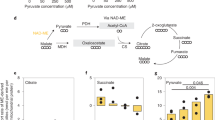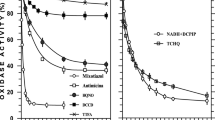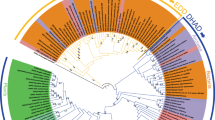Abstract
EXTRACTS of spinach leaves1 and of wheat germ2 contain a phosphoenolpyruvic carboxylase which, in the presence of magnesium or manganese ions, catalyses the reaction: 
This is a preview of subscription content, access via your institution
Access options
Subscribe to this journal
Receive 51 print issues and online access
$199.00 per year
only $3.90 per issue
Buy this article
- Purchase on Springer Link
- Instant access to full article PDF
Prices may be subject to local taxes which are calculated during checkout
Similar content being viewed by others
References
Bandurski, R. S., and Greiner, C. M., J. Biol. Chem., 204, 781 (1953).
Tchen, T. T., and Vennesland, B., J. Biol. Chem., 213, 533 (1955).
Bandurski, R., J. Biol. Chem., 217, 137 (1955).
Brown, J. M. A., Ph.D. thesis, University of Durham (1956).
Umbreit, W. W., Burris, R. H., and Stauffer, J. F., “Manometric Techniques and Tissue Metabolism”, 25 (Minneapolis, 1949).
Thomas, M., and Ranson, S. L., New Phytol., 53, 1 (1954).
Author information
Authors and Affiliations
Rights and permissions
About this article
Cite this article
WALKER, D. Malate Synthesis in a Cell-free Extract from a Crassulacean Plant. Nature 178, 593–594 (1956). https://doi.org/10.1038/178593b0
Issue Date:
DOI: https://doi.org/10.1038/178593b0
This article is cited by
-
David Alan Walker (1928–2012)
Photosynthesis Research (2012)
-
From Chlorella to chloroplasts: a personal note
Photosynthesis Research (2007)
Comments
By submitting a comment you agree to abide by our Terms and Community Guidelines. If you find something abusive or that does not comply with our terms or guidelines please flag it as inappropriate.



